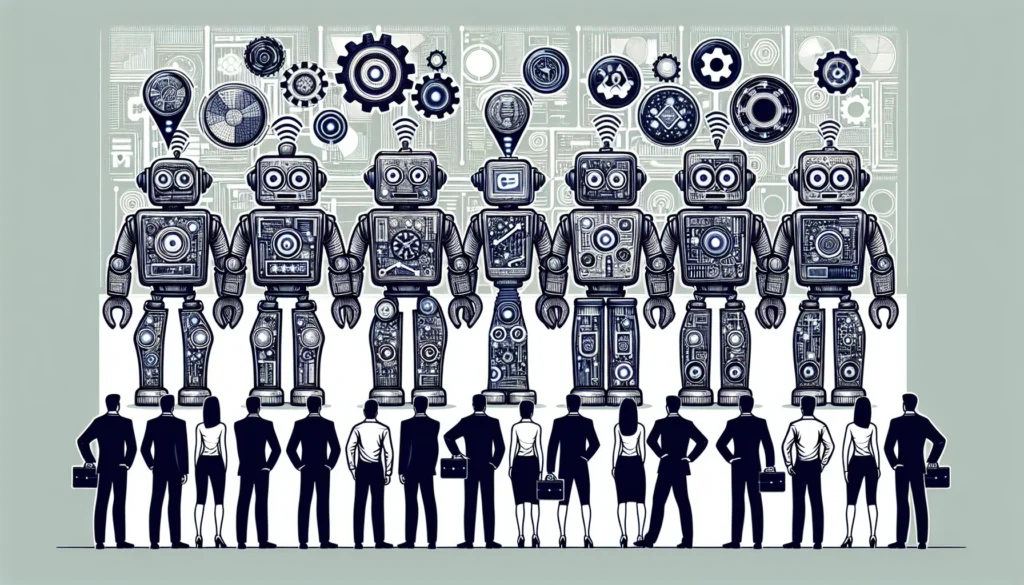Table of Contents[Hide][Show]
What differentiates the winners from the rest in today’s market? AI marketing. This strategic tool combines data analysis and machine learning to refine customer engagement and streamline marketing tasks. With 64% of marketers now integrating AI in digital marketing, it’s a game changer that’s not to be ignored. Learn the ins and outs, from practical tools to successful strategies, and see how AI marketing can give your brand the competitive edge.
Key Concepts
AI marketing tools, leveraging machine learning and data analysis, are enhancing operational efficiencies and vastly improving customer engagement strategies, which are crucial for brands to meet and surpass digital marketing goals in the dynamic marketplace.
Selecting the right AI marketing tools—such as AI-driven content personalization, predictive analytics, and AI chatbots—for specific business needs is fundamental for enhancing the efficiency of marketing campaigns and ensuring seamless integration within existing systems.
In implementing AI marketing strategies, companies must focus on defining clear goals, evaluating existing infrastructure, building a skilled team, selecting appropriate tools, and continuously monitoring and adapting to maintain effectiveness in an evolving marketing landscape.
The Rise of AI Marketing

The marketing world has been transformed by the advent of AI, with businesses leveraging this potent technology to meet the ever-evolving challenge of engaging customers. AI marketing has become an indispensable strategy, utilizing a blend of data and machine learning to tailor experiences with a seamlessness that was once the stuff of science fiction. The economic impact is undeniable; companies harnessing AI marketing are not just keeping pace but setting the tempo in a marketplace where consumer behaviors shift like sand dunes in the wind.
These tools have ushered in operational efficiencies that would have been unimaginable a decade ago, liberating marketing teams from the mundane to embrace the strategic. Cost savings are just the beginning; the real treasure lies in the enriched customer engagement strategies. By aligning marketing operations with brand visions, companies are now meeting and surpassing revenue goals in an arena where only the most adaptive survive.
Some key benefits of these tools include:
Increased efficiency and productivity
Enhanced data analysis capabilities
Improved campaign management
Better customer engagement and personalization
A staggering 64% of marketing professionals acknowledge the surge in AI adoption, spotlighting its significance in data analysis and campaign management across industries.
Importance of AI in Marketing
AI has woven itself into the very fabric of marketing teams’ strategies, proving its worth beyond mere hype. By harnessing data collection, natural language processing, and machine learning, AI peels back layers of customer insights, driving the personalization and optimization of marketing activities. The result? A marked reduction in customer acquisition costs and a significant amplification in both revenue and marketing ROI that speak volumes of AI’s transformative potential.
Yet, amidst this technological symphony, the conductor’s baton still belongs to human intelligence and creativity. As much as AI propels marketing tasks to new heights, it’s the human touch that guides these systems to effectiveness. AI is not a replacement but an enabler, enhancing the strategic capabilities of marketing teams while they steer the brand narrative.
Key Advancements in AI Marketing
The leap in advancements of AI marketing tools is nothing short of a quantum jump. Real-time data analysis now sits at marketers’ fingertips, allowing them to make informed decisions at the speed of light. Audience segmentation has become an art form, with machine learning algorithms painting a picture of targeted and effective marketing campaigns. These tools also extend their prowess to customer support, personalizing offers and dissecting customer data with an insightful eye.
Some advancements in marketing technology include:
AI-driven content personalization
AI-generated content drafts for various formats
Nuanced sentiment analysis for attuned marketing content
These advancements offer a tailored experience that resonates on a personal level and make content creation and analysis more efficient.
Essential AI Marketing Tools for 2024
As we plunge into the depths of 2024, certain AI marketing tools have risen as the titans of the industry. Some of these tools include:
ChatGPT, which assists in content generation for everything from blog ideas to social media posts
Jasper, an AI-powered tool for content generation
HubSpot’s AI-powered Content Assistant, which helps with content creation and optimization
Optimove, an AI tool that guides marketers through customer behaviors and helps with campaign adjustments
AI-powered chatbots like Tidio, which optimize conversion rates by refining customer interactions and fostering loyalty
These tools are revolutionizing the marketing industry and helping businesses achieve their goals.
In this toolkit, platforms like Sprout Social stand out, integrating various AI capabilities into a single hub. Here, marketers find an intuitive space to manage a plethora of functions, all while leveraging AI to streamline their marketing operations. It’s about choosing the right tool for the job, and in 2024, the toolbox is both vast and sophisticated.
AI-Powered Analytics Tools
At the heart of AI marketing tools lies a core of predictive analytics, pulsating with the power of machine learning. These tools are the crystal balls of the digital age, forecasting customer behavior with astonishing accuracy, as seen with Amazon’s product suggestions that keep shoppers coming back for more. The ability to sift through extensive online data provides marketers with a bird’s eye view of brand sentiments and market trends—information that’s pivotal for tweaking and refining marketing strategies in real-time.
Enhancing customer experience is a prime directive for AI-powered analytics tools. By personalizing content, anticipating needs, and streamlining processes, AI tools lead to more efficient customer service that borders on precognition. Superior ad targeting has become a reality, with AI cutting through the clutter to deliver advertisements that not only grab attention but hold it.
And as voice-based shopping begins to take center stage, AI marketing must also navigate new privacy and data security considerations, ensuring a balance between innovation and consumer protection.
Content Generation and Optimization Tools

In the realm of content generation and optimization, AI marketing tools are the trusted scribes and editors. They provide templates and suggestions, transforming the blank page into a canvas for creativity, be it for landing pages, blogs, or social media content. SEO-friendly content is now at the marketer’s fingertips, with AI tools offering keyword research, writing assistance, and suggested edits to enhance clarity and search engine, as well as generative engine optimization (GEO) and rankings.
Personalization is the name of the game, and through analysis of user data, these AI-driven tools deliver content that strikes a chord with each individual in the target audience. Engaging users with immediacy and relevance is not just a strategy—it’s a necessity in a world where attention is the most coveted currency.
However, the reliance on AI-generated content comes with a caveat: it requires continuous review and refinement to ensure it reflects the brand’s reputation and meets the evolving standards of the market.
AI-Driven Automation Platforms
The automation of marketing tasks through AI-driven platforms is like setting sail on a sea of possibilities. These ai marketing platforms automate the mundane, analyze complex data, and generate insights that shape optimized marketing strategies. The result? Fewer errors due to human oversight and more time for marketers to focus on strategic initiatives that drive growth.
Take Zapier, for instance, an AI-driven platform that:
Turns text inputs into actionable data
Enables businesses to scale their operational capabilities using insights from automated workflows
Enhances email marketing
Makes content more engaging
Tailors communications to subscriber behaviors
With AI, chatbots can also personalize the customer journey, engaging in dynamic conversations that provide relevant information at just the right moment.
Implementing AI Marketing Strategies

Embarking on the journey of implementing AI marketing strategies into your existing marketing tech stack is akin to charting a course through uncharted waters. The first step is establishing clear goals and expectations, which act as the lighthouse guiding your marketing campaign to the shores of success. From there, it’s about building a vessel sturdy enough to withstand the turbulent waves of the marketing world. This involves:
Evaluating infrastructure
Assembling a skilled team
Selecting the right tools
Continuously adapting to the changing currents.
Every successful campaign begins with a blueprint, a master plan of what you aim to build. It’s about knowing where you want to go and having the metrics in place to measure your progress. Whether it’s augmenting sales or enhancing brand awareness, these objectives form the foundation of your AI marketing strategy.
With 62% of marketing leaders considering hiring solely for AI expertise, it’s clear that the importance of having a skilled crew cannot be overstated. The right team will navigate the evolving marketing landscape, leverage AI marketing tools, and harness the full potential of digital marketing.
Defining Goals and Objectives
In the quest for marketing excellence, setting specific, measurable goals is akin to charting a star to navigate by. These objectives guide your AI marketing strategy, allowing you to align your marketing efforts with your business’s primary objectives, such as boosting sales or raising brand awareness. It’s about aiming to increase online sales by a certain percentage within a defined timeframe and having the operational efficiency to make it happen.
Evaluating Existing Infrastructure
Before deploying AI’s full arsenal, one must first understand the lay of the land—or rather, the current marketing infrastructure. Identifying the strengths and weaknesses within your strategy is crucial for effectively leveraging AI. This understanding allows you to tap into AI’s potential for personalization and efficiency, as seen with chatbots that learn and improve over time, offering an expanding opportunity for customer engagement.
The integration with marketing automation tools is set to become more sophisticated, supporting marketers in delivering content to well-defined segments with precision.
Building a Skilled Team
The cornerstone of any successful AI marketing strategy is a skilled team. Despite the dazzling capabilities of AI, many ai marketing teams find themselves at sea without the necessary expertise in data science and AI. Training and development are key, maximizing the potential of AI tools through live training sessions and incorporating employee feedback during implementation.
Understanding the team’s needs and current workflows is essential to identify opportunities for seamless AI integration, ensuring human expertise remains at the helm of complex consumer behavior analysis.
Selecting the Right AI Tools
Navigating the vast ocean of AI marketing tools can be daunting. It’s imperative to understand the different tools available to ensure they align with your team’s needs and objectives. Compatibility with existing marketing systems is a crucial consideration, as is the ease of onboarding and integration capabilities with the current tech stack.
This careful selection process is about finding the right measurement tools that can be leveraged to achieve your marketing goals without disrupting the flow of ongoing activities.
Monitoring and Adapting
After setting sail with AI marketing tools, monitoring their impact on team performance and business growth is essential for navigating the tides of change. Evaluating the effectiveness of these tools involves keeping a keen eye on key performance indicators (KPIs) and being ready to adapt marketing strategies based on performance data and customer feedback.
Continuous learning and adaptation ensure that AI applications remain effective and relevant, even as the marketing landscape shifts.
Overcoming Challenges in AI Marketing
Mastering AI marketing is not without its challenges. Companies must:
Craft bespoke strategies that address specific challenges, leverage opportunities, and cater to their audience’s unique needs.
Ensure that creativity is not cast aside in favor of automation; it’s about finding harmony between the two, ensuring AI enhances originality rather than suppressing it.
Maintain a delicate balance between artification intelliegnce automation and human oversight, with the human touch being essential to capture the nuances in customer interactions.
Reviewing AI-generated content to guarantee alignment with the brand’s voice is critical before launching campaigns. Time must be invested in understanding and effectively prompting AI technologies, acknowledging the additional demand on marketing workload that can bring long-term efficiencies. Navigating the rapidly evolving AI marketing tool landscape can be overwhelming, but it’s a necessity for remaining competitive and effective.
As AI integration continues, addressing fears of job displacement within the team with transparency and education about AI’s role can help mitigate concerns about job security.
Data Privacy and Security
In today’s digital age, ensuring data privacy and protection is paramount, especially when dealing with customer information in AI marketing. Compliance with regulations such as GDPR and CCPA is not just mandatory; it’s a cornerstone of ethical practice, particularly concerning the use of cookies and consumer data. VPNs serve as digital moats, restricting data access and aligning with industry-specific laws concerning data movement and access.
Brands carry an ethical responsibility to implement robust data security measures and to educate their customers about these practices. Transparency in data collection can bolster consumer trust and contribute to a loyal customer base. Regular data updates, anonymizing personal data, and stringent access controls are recommended practices to maintain privacy in AI marketing analytics.
Moreover, managing confidential data professionally throughout the business relationship lifecycle is critical to prevent unauthorized post-contract data usage.
Ensuring Quality Data
Data is the lifeblood of AI marketing, and its quality is non-negotiable for success. High-quality data inputs ensure that machine learning and AI programs operate with precision, making accurate and effective decisions. Inaccurate data can derail marketing strategies, leading to misguided campaigns and wasted resources. It’s akin to setting sail with a faulty compass: without a reliable direction, you’re lost at sea.
Therefore, maintaining the integrity of your data is essential, as it forms the backbone of any AI-driven marketing endeavor.
Balancing AI and Human Expertise
While AI’s ability to process vast amounts of data at lightning speed is unparalleled, it lacks the human capacity to interpret cultural subtleties and emotional nuances that are crucial in shaping consumer behavior. Human marketers play an indispensable role in interpreting AI-driven analytics and applying them within the appropriate context. They bring creativity, strategic thinking, and most importantly, a human touch to the table—qualities that AI, for all its sophistication, cannot replicate.
This symbiotic relationship between AI and human expertise is the cornerstone of a marketing strategy that is not only effective but also resonant and ethical.
Real-Life Examples of AI Marketing Success
Leading brands have already set sail on the AI marketing voyage, charting courses that others can follow. Some prime examples include:
Coca-Cola, which uses AI for digital advertising optimization with Albert
The Economist, which utilizes AI-driven ad content delivery to engage millions of new readers
These trailblazers not only demonstrate AI’s potential but also serve as beacons for others to emulate.
Case Study
Grab’s integration of AI through Ada’s innovations is a case study that illustrates the significant impact AI can have on marketing efforts. The deployment of tools led to a staggering reduction in customer query backlog by 90% and a 23% decrease in operational costs. This strategic move allowed Grab to not only improve efficiency but also to expand its market reach internationally.
The success story of Grab highlights the operational efficiencies and market expansion possibilities that AI marketing tools can unlock for businesses.
Future of AI Marketing: Trends and Predictions
The horizon of AI marketing is ever-expanding, with trends and predictions pointing towards an even more integrated and personalized future. The combination of AI with virtual and augmented reality promises to immerse customers in experiences that transcend traditional marketing. As AI matures, we anticipate the emergence of AI assistants that not only suggest but predict future consumer needs, ushering in an era of anticipation marketing. Personalization will become even more sophisticated, with systems capable of real-time analysis of customer data, offering hyper-targeted experiences that feel tailor-made for each individual.
Ethical considerations will take center stage as the importance of responsible AI marketing grows. Marketers will need to prioritize data privacy, ensure transparency, and address the potential biases inherent in AI systems. As algorithms increasingly influence the content and ads seen by customers, clear communication about their role will be crucial.
The future of AI marketing is not just about harnessing technology but doing so in a way that upholds the values of trust and fairness in the digital age.
Integration of AI and Emerging Technologies
The integration of artificial intelligence with emerging technologies is set to revolutionize marketing practices. Some examples of this include:
AI video generation tools and AI image generation tools can create marketing content in timelines once deemed impossible.
AI-powered chatbots, which can provide personalized customer service and support.
AI algorithms that can analyze large amounts of data to identify trends and patterns, helping marketers make more informed decisions.
AI-powered recommendation engines, which can suggest products or content to users based on their preferences and behavior.
- AI can even power recommendations for email marketing, SEO tools and soon likely every part of the digital marketing land scape
These advancements in AI offer marketers new realms to explore and engage with their audiences, blurring the lines between the digital and physical worlds.
As AI continues to integrate with technologies like VR and AR, the possibilities for creative and immersive marketing are boundless, especially with the emergence of generative AI.
Increased Personalization and Hyper-targeting

The winds of change in AI marketing are steering towards increased personalization and hyper-targeting. AI’s advanced data processing capabilities allow for an unprecedented level of content customization, based on granular analyses of consumer data. Real-time content personalization, adapting to the user’s current interactions, will become the standard, offering a dynamic customer experience that feels both immediate and highly relevant.
However, this surge in personalization brings with it data privacy considerations, necessitating responsible strategies to protect consumer information while delivering personalized messages.
Ethical Considerations in AI Marketing
As we chart the future course of AI marketing, ethical considerations must be at the helm. Ensuring data privacy, security, and transparency is essential, as is the commitment to avoid bias and ensure fairness. Marketers must navigate these ethical waters carefully, with regular audits of AI systems, diverse training data, and clear accountability measures to mitigate bias.
Transparent AI marketing efforts not only build trust with consumers but also adhere to the overarching principles of ethical marketing that will define the success of AI marketing strategies in the years to come.
Conclusion
As we conclude our voyage through the dynamic world of AI marketing, it’s clear that the fusion of artificial intelligence and human creativity is not just reshaping marketing strategies but redefining the very way we engage with customers. From the precision of AI-powered analytics to the personal touch of human expertise, the balance between technology and creativity is the lynchpin of marketing success. The real-life examples and future predictions underscore the transformative power of AI in marketing, opening new horizons for businesses ready to embrace this evolution. Let this be your inspiration to chart a course towards a future where AI and marketing sail together towards uncharted territories of growth and innovation.
Frequently Asked Questions
How is AI used in marketing?
AI is used in marketing to automate tasks like lead generation, lead scoring, and customer retention, helping marketers identify potential customers and engage with them at the optimal time for positive responses. Additionally, it conducts data analysis and predictive analytics to generate insights about future customer behavior and suggest personalized content.
Does AI marketing actually work?
Yes, AI marketing can help deliver personalized messages to customers at key points in their journey and identify at-risk customers for targeted re-engagement, offering substantial benefits to marketers. With 71% of AI marketers reporting improved customer personalization, its capabilities are rapidly growing.
What is the best example of AI in marketing?
The best example of AI in marketing is Netflix using AI to provide personalized recommendations, which enhances customer experience and engagement.
How Nike uses AI for marketing?
Nike uses AI to personalize their customer engagement through mass-produced retail stores, individual customer interactions, and state-of-the-art apps and customization programs, providing a more personal way to communicate their products.
How does AI improve the content generation process?
AI improves the content generation process by offering templates, suggestions, and SEO-friendly edits, enabling marketers to create relevant and engaging content more efficiently. This ultimately leads to time and resource savings.

 Social Media Strategy: Proven Tactics for Engagement and Growth
Social Media Strategy: Proven Tactics for Engagement and Growth